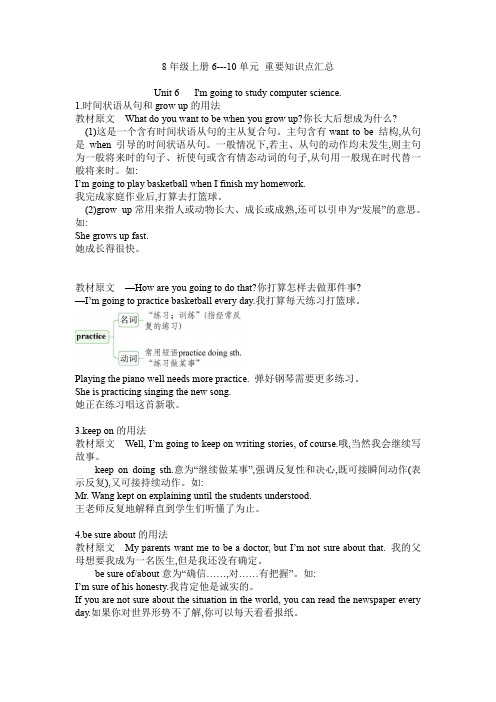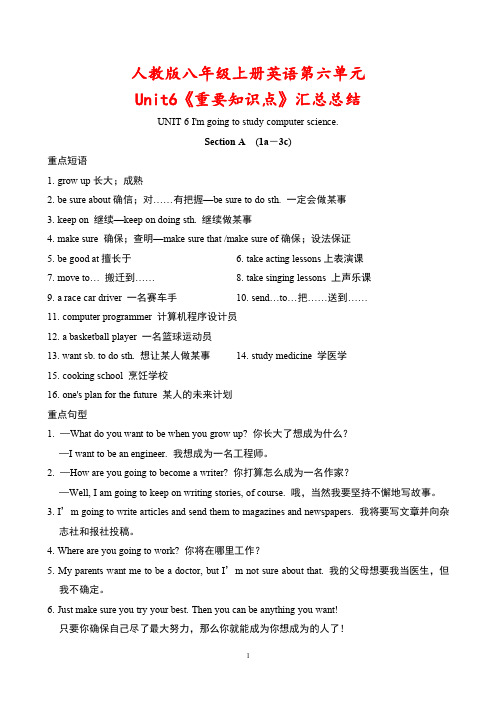教版八年级英语上册第六单元知识点总结
- 格式:doc
- 大小:45.00 KB
- 文档页数:3

8年级上册6---10单元重要知识点汇总Unit 6 I'm going to study computer science.1.时间状语从句和grow up的用法教材原文What do you want to be when you grow up?你长大后想成为什么? (1)这是一个含有时间状语从句的主从复合句。
主句含有want to be 结构,从句是when引导的时间状语从句。
一般情况下,若主、从句的动作均未发生,则主句为一般将来时的句子、祈使句或含有情态动词的句子,从句用一般现在时代替一般将来时。
如:I’m going to play basketball when I finish my homework.我完成家庭作业后,打算去打篮球。
(2)grow up常用来指人或动物长大、成长或成熟,还可以引申为“发展”的意思。
如:She grows up fast.她成长得很快。
教材原文—How are you going to do that?你打算怎样去做那件事?—I’m going to practice basketball every day.我打算每天练习打篮球。
Playing the piano well needs more practice. 弹好钢琴需要更多练习。
She is practicing singing the new song.她正在练习唱这首新歌。
3.keep on的用法教材原文Well, I’m going to keep on writing stories, of course.哦,当然我会继续写故事。
keep on doing sth.意为“继续做某事”,强调反复性和决心,既可接瞬间动作(表示反复),又可接持续动作。
如:Mr. Wang kept on explaining until the students understood.王老师反复地解释直到学生们听懂了为止。

最全面人教版八年级上册英语第六单元知识点归纳总结本文总结了最全面的人教版八年级上册英语第六单元的知识点,帮助学生更好地掌握相关内容。
1. 单词和词组- blame 责备- calm 冷静的- disturb 打扰- escape 逃脱- evidence 证据- interrupt 打断- judge 判断- likely 可能的- pleased 高兴的- prove 证明- reduce 减少- reply 回答- scream 尖叫- select 选择- thunder 雷- witness 目击者2. 语法- 第三人称单数的一般现在时:he, she, it开头的句子要加-s或-es- 祈使句:以动词原形开头,表示命令或请求- 反意疑问句:在陈述句之后用一个简短的问句来表示征求对方的意见或与对方进行确认- 现在进行时:be动词(am/is/are)+动词的现在分词形式(-ing)3. 句型- What's wrong with you? 你怎么啦?- How about going shopping? 去逛逛怎么样?- Sorry, I can't. I have to help my parents. 不好意思,我不能。
我必须帮助我的父母。
- What would you like for dinner? 晚餐你想吃什么?4. 阅读理解技巧- 注意理解文章的主题和细节- 使用上下文线索进行推断- 将段落分解为句子逐一阅读- 多读多练,提高理解能力以上是人教版八年级上册英语第六单元的知识点归纳总结,希望对学生们的研究有所帮助。

人教版八年级上册英语第六单元Unit6《重要知识点》汇总总结UNIT 6 I'm going to study computer science.Section A(1a-3c)重点短语1. grow up长大;成熟2. be sure about确信;对……有把握—be sure to do sth. 一定会做某事3. keep on 继续—keep on doing sth. 继续做某事4. make sure 确保;查明—make sure that /make sure of确保;设法保证5. be good at擅长于6. take acting lessons上表演课7. move to… 搬迁到…… 8. take singing lessons 上声乐课9. a race car driver 一名赛车手10. send…to…把……送到……11. computer programmer 计算机程序设计员12. a basketball player 一名篮球运动员13. want sb. to do sth. 想让某人做某事14. study medicine 学医学15. cooking school 烹饪学校16. one's plan for the future 某人的未来计划重点句型1. —What do you want to be when you grow up? 你长大了想成为什么?—I want to be an engineer. 我想成为一名工程师。
2. —How are you going to become a writer? 你打算怎么成为一名作家?—Well, I am going to keep on writing stories, of course. 哦,当然我要坚持不懈地写故事。
3. I’m going to write articles and send them to magazines and newspapers. 我将要写文章并向杂志社和报社投稿。

Unit6 I’m going to study computer science.一、词的转换1.violin小提琴(表人)violinist 小提琴家2.piano钢琴(表人)pianist 钢琴家3.science科学(表人)scientist科学家4.drive开车(表人)driver 司机cation教化(形容词)educational 有教化意义的6.send发送过去式sent7.foreign外国(表人)foreigner外国人8.mean意味着(名词)meaning意思9.discuss探讨(名词)discussion探讨10.begin开场(名词)beginning开场11.hobby爱好(复数)hobbies12.week一周(形容词)weekly每周的13.one person一个人(不行以说one people) (形容词)personal个人的14.different 不同的(名词)differences不同、差异二、短语归纳1.grow up成长;长大2. improve in 在.......有所进步3.be sure about对……有把握4.make sure确信;务必+to do sth5.send…to…把……送到……6.be able to do sth 可以做某事=can+动词原形7.the meaning of……的意思8.different kinds of不同种类的 a kind of一种9.write down写下;登记10.have to do with关于;与……有关系11.take up开场做;学着做.take up a hobby12.for this reason 为此13. too…to…太……而不能……14. study computer science 学习计算机科学15.a basketball player 篮球运发动16. write stories/articles 写故事/文章17.become a writer成为一名作家18. Don’t worry.不要担忧19. Try your best尽最大努力20. take lessons上课take+名词+lessons take acting/singing/guitar/cooking lessons 上表演课/音乐课/吉他课/烹饪课21. hope +that从句盼望hope to do sth盼望去做某事22.go to a cooking school去烹饪学校23.move to +地点move to Shanghai移居上海24 New Year’s Resolution新年的决心25.get lots of exercise 多熬炼26.learn another foreign language 再学一门外语27. sound like +名词/ 代词听起来像28. make resolutions 下决心;制定支配29. at the beginning/start of the year 在新年开场时30.eat less fast food 少吃快餐31.have to do with与…有关系have nothing to do with 与…无关32.make a weekly plan 制订每周的支配33.have one thing in common 有一点一样34. improve my physical health改善我的身体安康35. improve my relationships with my family and friends改善我与我家人、挚友的关系三、用法集萃1.be going to+动词原形准备做某事2.practice doing练习做某事3.keep on doing sth.不断地做某事,keep+sth+adj使某物保持……4.learn to do sth.学会做某事5.finish doing sth.做完某事6.promise to do sth.许诺去做某事7.help sb. to do sth.扶植某人做某事8.remember to do sth.记住做某事9.agree to do sth.同意做某事 agree with sb 同意某人 四、重点句子1.What do you want to be when you grow up? 你长大后准备做什么?2.How are you going to do that? 你准备怎样去做呢?3.I am going to practice basketball every day. 我准备每天练习篮球。

一)习惯用语:look the same=look like 看起来像in some ways在某些方面as you can see 正如你能看到的look different 看起来不同in common 共同的as +<形容词/副词原级> +as …与…一样not as/so…as… …不如…more than=over 多于,超过be good at=do well in sth./doing sth.爱好于…make sb. +do 使某人…have good grades 成绩优良be good with sb. 善于与某人相处call…at +电话号码拨…找…stop doing sth. 停止做某事stop to do sth. 停下来做某事begin with..以…开始most of……中的大多数primary school 小学both…and… 两者都laugh at…嘲笑…my twin sister 我的双胞胎姐姐be outgoing 爱抛头露面short hair 短发more athletic 更健美the same as 同……一样lots of 许多3 centimeters taller 高了三厘米二)重点句型:1.I'm more outgoing than my sister.我比我妹妹更爱出风头。
2.He has shorter hair than Sam.他的头发比山姆的短。
3.Tom is more athletic than Sam.汤姆比山姆更健美。
4.Liu Ying is not as good at sports as her sister.刘莹不如她姐姐擅长体育。
5.Both girls go to lots of parties.两个女孩都参加了许多晚会。
6.In some ways we look the same,and in some ways we look different.在某些方面,我们看起来一样,在某些方面,我们看起来不同。

人教版八年级英语上册第6单元知识点总结Unit6 l'm more out going than My sister一,词汇精讲。
heavy与thin的用法是一组意义相反的形容词,都可用来描述人的体型。
heavy意为“ 胖的,笨重的”,比较级形式为heavier; thin意为“瘦的”,其比较级形式为thinner.'He is very heavy, but his brother is thin.他很胖,可他的哥哥却瘦。
拓展:heavy还可意为“重的;剧烈的;大的”等。
heavy rain/snow/smoker大雨/大雪/浓烟heavy/smoker/drinker/ eater烟瘾/酒量/食量大的人have a heavy cold患重感冒heavy (busy) traffick交通拥挤2、quiet 与outgoingquiet是形容词,意为“安静的,文静的” 可作定语或表语文词outgoing; outgoing意为“外向的,友好为;擅于交际的”,其比较级为more outgoingThey walked to a quiet place.他们向一个安静的地方走去。
You have a cold, so you quiet at home.你感冒了,所以必须在家静养。
He is more outgoing than me.他比我更外向。
When we face danger, we should keep calm.面对危险,我们应该保持沉着、冷静。
The baby kept still when she was taking photos.当给这个婴儿拍照时,她一动也不动。
Be quiet, everyone. The teacher is coming. 同学们,安静!老师来了。
We shouldn't keep silent when the teacher asks us some questions.当老师问我们问题时,我们不应该保持沉默。
英语八年级上册第六单元知识点总结英语八年级上册第六单元知识点(1)grow up成长;长大(2)every day每天(3)e sure about对……有把握(4)make sure确信;务必(5)want to do sth.想要做某事(6)send…to…把……送到……(7)be able to能(8)the meaning of……的意思(9)different kinds of不同种类的(10)agree to do sth.同意做某事(11)write down写下;记下(12)have to do with关于;与……有关系(13)take up开始做;学着做(14)hardly ever几乎不;很少(15)help sb. to do sth.帮助某人做某事(16) too…to…太……而不能……(17)love to do sth.喜爱做某事(18)be going to+动词原形打算做某事(19)practice doing练习做某事(20)keep on doing sth.不断地做某事(21)promise to do sth.许诺去做某事(22)learn to do sth.学会做某事(23)finish doing sth.做完某事(24)remember to do sth.记住做某事英语八年级上册知识短语归纳milk shake奶昔turn on接通(电流、煤气、水等);打开pour…into…把……倒入……a cup of yogurt一杯酸奶a good idea好主意on Saturday在星期六cut up切碎put…into…把……放入……one more thing还有一件事a piece of一片/张/段/首……at this time在这时a few一些;几个fill… with…用……把……装满cover…with…用……覆盖……one by one一个接一个;逐个;依次a long time很长时间how many+可数名词复数多少……how much+不可数名词多少……It’s time (for sb.)+to do sth.到(某人)做某事的时间了First…Next…Then…Finally 首先……接下来……然后…….最后……want + to do sth.想要做某事forget+to do sth.忘记去做某事how + to do sth.如何做某事need+to do sth.需要做某事make+宾语+形容词使……怎样let sb.+do sth.让某人做某事英语八年级上册第知识点汇总1be going to的用法1)be going to+动词原形——表示将来的打算、计划或安排。
人教版八年级上册英语Unit 6 知识点语法归纳总结Unit 6 Grammar SummaryIn this unit, we have learned several important grammar points related to tenses, sentence structures, and word usage. In this summary, we will outline and explain these points to reinforce our understanding.1. Present tenses:- Present simple: Used for habitual actions and general truths. Formed with the base form of the verb, adding 's' or 'es' for third-person singular subjects.- Present continuous: Used for actions happening at the moment of speaking or temporary actions. Formed with the present tense of the verb 'be' (am, is, are) + the present participle (-ing form) of the main verb.2. Past tenses:- Simple past: Used for completed actions in the past. Regular verbs are formed by adding '-ed' to the base form, while irregular verbs have specific forms.- Past continuous: Used for actions that were in progress at a specific time in the past. Formed with the past tense of the verb 'be' (was, were) + the present participle (-ing form) of the main verb.3. Future tenses:- Will + base form: Used for future predictions, decisions, and promises.- Be going to + base form: Used for future plans or intentions.- Present continuous: Used for future arrangements or fixed plans.4. Gerunds and infinitives:- Gerunds: Verb forms ending in '-ing' that function as nouns.- Infinitives: Base form of the verb preceded by 'to' that can function as nouns, adjectives, or adverbs.5. Passive voice:- Formed with the auxiliary verb 'be' + past participle. The subject of the active voice sentence becomes the object in the passive voice.6. Reported speech:- Reporting verbs such as say, tell, ask, etc., are used to report what someone said.- Reported speech involves changing verb tenses, pronouns, time expressions, and place expressions.7. Conditional sentences:- Zero Conditional: Used for general truths and facts. Formed with present simple in both the if-clause and the main clause.- First Conditional: Used for possible events in the future. Formed with present simple in the if-clause and future simple (will + base form) in the main clause.- Second Conditional: Used for hypothetical or unreal events in the present or future. Formed with past simple in the if-clause and would + base form in the main clause.- Third Conditional: Used for hypothetical or unreal events in the past. Formed with past perfect in the if-clause and would have + past participle in the main clause.8. Comparative and superlative forms:- Comparative: Used to compare two things. Most adjectives add '-er' or use 'more' before the adjective. Irregular forms have specific comparative forms.- Superlative: Used to compare three or more things. Most adjectives add '-est' or use 'most' before the adjective. Irregular forms have specific superlative forms.Remember to practice these grammar points through exercises and conversation to develop a strong foundation in English grammar.。
八上Unit 6 I’m going to study computer science.P411.What do you want to be when you grow up? 当你长大时你想成为什么?2.I want to be a computer programmer. 我想成为一个计算机程序员。
3.How are you going to do that?你打算怎么实现?how 对方式提示4.I’m going to study computer science. 我打算学习计算机科学。
Note: be going to do 打算做某事,一般将来时结构:主语+am/ is/ are going to do sth.变否变疑,有be直接用:变否定找到be动词后面加not,变一般疑问找到be动词大写提句首。
P421.What are you reading, Ken? 现在进行时am/is/are doing2.The Old Man and the Sea by Hemingway. by 由……著作3.Wow, now I know why you are so good at writing stories. Be good at doing sth. 擅长做某事。
4.Well, I’m going to keep on writing stories. 持续做某事5.Not everyone knows what they want to be. Just make sure you try your best. Make sure 确保try one’s best 尽某人最大的努力。
P451.Most of the time, we make promises to other people. 许诺2.When we make resolutions at the beginning of the year, we hope that we are going to improve our lives. Make resolutions 下决心,做决定at the beginning of 在……的开始improve our lives 改善我们的生活。
八年级上册英语unit6知识点英语是一种西日耳曼语支,最早被中世纪的英国使用,并因其广阔的殖民地而成为世界使用面积最广的语言。
这次小编给大家整理了八年级上册英语unit6知识点,供大家阅读参考。
单词grow up 长大;成熟;成长computer programmer / 'pr??gr?m?(r)/计算机程序设计员;编程人员cook /k?k/ n.厨师v.烹饪;煮doctor /'d?kt?(r)/,/ 'dɑ:kt?(r)/ 医生engineer / ,end??'n??/ ,/end??'n?r/ 工程师violinist /'va??'l?n?st/小提琴手driver / 'dra?v?(r)/ n.驾驶员;司机pilot /'pa?l?t/ n.飞行员pianist /'p??n?st/ n.钢琴家scientist/'sa??nt?st/ n.科学家be sure about 确信;对……有把握make sure 确保;查明college /' k?l?d?/,/'kɑ:l?d?/ n.学院;大学;高等教育education /'ed?u'ke??n/ n.教育medicine /'medsn, 'med?sn / n.药;医学university /'ju:n?'v?:rs?ti/ n.(综合性)大学;高等学府London / 'l?nd?n/ 伦敦article /'ɑ:(r)t?kl/ n.文章;论文send /send/ v.邮寄,发送resolution /,rez?'lu:?n/ n.决心;决定team /ti: m/ n.队;组foreign /'f?:r?n/ daj.外国的able /'e?bl/ adj.能够be able to 能够做某事question / 'kwest??n/ v.表示疑问;怀疑;提问;质询meaning /' mi:n?? / n. 意义;意思discuss /d?'sk?s/ v.讨论,商量promise / pr?m?s/,/ 'pr a: m?s/ n.承诺;诺言;v.许诺;承诺beginning / b?'g?n?? / n.开头;开端at the beginning of 在……开始improve /?m'pruv/ v.改进,改善write down 写下;记录下physical /'f?z?kl/ adj.身体的themselves / ??m'selvz/ pron.他(她、它)们自己have to do with关于;与……有关系self-improvement/self ?mp'ru:vm?nt/ n.自我改进,;自我提高take up(尤指为消遣)学着做;开始做hobby / 'h?bi/,/'hɑ:bi/ n.业余爱好weekly / 'wi:kli/ daj.&adv.每周的(地)schoolwork /'sku:lw?:k/ n.学校作业;功课agree / ?'gri:/ v.同意;赞成;允许agree with 同意own /o?n/ adj&pron 自己的;本人的personal /'p?:(r)s?nl/ adj.个人的;私人的relationship /r?'le??n??p/ n.关系;联系Andy /'?ndi/ 安迪(男名)Ken /ken/ 肯(男名)Hemingway /'hem??we?/ 海明威(姓)Kelly /'keli/ 凯莉(女名)The Old Man and the Sea 《老人与海》(美国作家海明威的小说) 重点短语1、grow up 长大2、every day 每天3、be sure about 对某事确信4、make sure 确信/有把握5、send…to…把…...发送到...…/把...…寄…...6、be able to 能/能够7、the meaning of …...的意思/含义8、 different kinds of 不同种类的9、have …..in common 有…共同点10、 at the beginning of 在…开始的时候11、write down 写下/记下12、 have to do with 与….有关系13、take up 开始从事/着手处理/接受14、 hardly ever 几乎不15、too…to… 太......而不能......重点句型1. What do you want to be/ become when you grow up?当你长大的时候想当什么?2. I want to be a/an computer programmer/ bus driver/ basketball player/ engineer/ cook/ teacher/ pilot/ scientist/ doctor/ violinist/ pianist /actor /actress/ singer/ race car driver/ reporter我想当……(职业名称)3. My parents want me to be a doctor, but I’m not sure about that.我的双亲想要我当医生,但我还不确定。